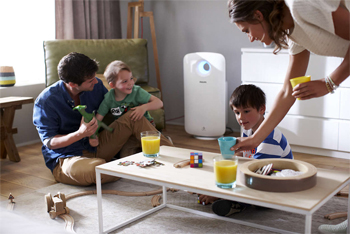Siobhan Brophy Keep Healthy in the Heat Interview

Siobhan Brophy Keep Healthy in the Heat Interview
You'll likely have read Sydney is on course for the hottest ever January as heat refuses to budge. Not only has Sydney been on high-alert regarding the extreme heat, a few weeks ago NSW Health issued a formal warning for those with respiratory conditions such as asthma and hay fever in response to the rising air pollution and ozone levels in the wider city.
Interview with Siobhan Brophy, Philips Air and National Asthma Council Australia Spokesperson
Question: Can you share your five tips to keeping healthy in the sweltering heat this summer?
Siobhan Brophy: Avoid the triggers you can control
It's difficult to control the outdoor pollution you're exposed to but it's possible to have an influence on your indoor environment. Volatile Organic Compounds (VOCs) are good to look out for – some occur naturally but others can cause irritation for allergy and asthma sufferers. VOCs can come from furniture, paint, flooring (particularly when new) as well as cigarette smoke, so stay clear of second-hand smoke, particularly indoors. You can also ensure that any cleaning products you use in your home have a low-level of VOC chemicals – check the labels carefully.
Filter your air
We filter many things in our lives…our water, our photos, our friends and even those we choose to date however, not a lot of us filter the air in our homes. Air Purifiers contain filtration technology to purify the air in your home by getting rid of contaminants such as allergens, VOCs, viruses and gases. An Air Purifier like the Philips Air Purifier has been clinically proven to alleviate symptoms associated with pollen allergy in international clinical trials so it's certainly worth checking out one of these gadgets as a long-term investment for your family.
Time your errands
At the risk of sounding like the apocalypse is coming, consider staying indoors and avoiding outdoor exposure during the day, particularly if you're finding that the hot weather and the poor air quality is a trigger for your respiratory problems. Pollen levels tend to be at their highest before 9am, while ozone levels tend to be at their lowest in the morning, reaching their peak at around 7pm - so try and run errands mid-morning. Consider also visiting a site like sydneypollen.com.au who forecast pollen and mould levels during the day.
Drink water
Recent studies have found that dehydration can play a significant role in asthma and allergies. Aside from the many other benefits of increasing water intake (which will likely have been drummed into you already!) it's vital to drink plenty throughout the day to maintain a good hydration level to lessen your symptoms where possible.
Enlist the help of a professional
Don't feel like you have to endure worsening symptoms during the hot and humid weather. If you're having breathing difficulty and finding that it's interfering with your normal activity, it's important that you seek medical help. It's important also that asthma sufferers ensure all of their medication is available and up-to-date around this time of year – many people can often get caught off guard with expired or worse, no immediate access to the right medications. Sufferers can also call the national 1800 ASTHMA helpline (1800 278 462) for advice and support.
Question: How does heat affect those with asthma?
Siobhan Brophy: Everyone's asthma is different. Some people get asthma symptoms in hot humid air, while others are affected by hot dry air. Many people find extreme changes in the weather to be their biggest weather trigger – especially moving from a hot humid day outside into a cool building.
Question: Are there extra symptoms associated with asthma we should look out for in the extreme heat?
Siobhan Brophy: There aren't normally any extra or different symptoms, just stay alert to the usual signs that your asthma may be flaring up.
 Question: What should those with asthma know about the extreme heat?
Question: What should those with asthma know about the extreme heat?
Siobhan Brophy: Be aware of how you're feeling. If your asthma symptoms do start, act promptly to help stop it turning into an asthma attack. Also note that your reliever puffer doesn't like extreme heat either so make sure it's not stored in your car glovebox or directly under a sunny window.
Question: How can we keep ourselves cool, during extreme heat?
Siobhan Brophy: Try to avoid going out in the sun and make sure you cover up when you are outside. Swap your outdoor run for a gym session or a swim. An air-conditioned shopping centre, cinema or library can also be a good place to escape the heat. If your house isn't air-conditioned, use a portable fan to keep cool. This can work better if you close up the windows and doors to concentrate on keeping one main room cool.
Question: How will drinking water help with the asthma triggers such as extreme heat?
Siobhan Brophy: Staying hydrated is important, especially if you're exercising – because asthma shouldn't stop you being physically active. If exercise causes asthma symptoms, talk to your doctor.
Question: How is the rising air pollution and ozone levels in the wider city affecting those with asthma?
Siobhan Brophy: Air pollution and ozone levels can trigger asthma symptoms in certain people who have asthma. Keep an eye on the weather alerts for high pollution or high ozone days. On days of high pollution or ozone, or when there is bushfire smoke, try to stay indoors with the doors and windows closed. Also try to do as little outdoor activity as possible, especially later in the day. If your asthma symptoms do start, act promptly to stop it turning into an asthma attack.
Question: What are the main symptoms associated with asthma?
Siobhan Brophy: The most common asthma symptoms are:
Wheezing – a continuous, high-pitched sound coming from the chest while breathing
Shortness of breath – a feeling of not being able to get enough air
Chest tightness
Cough – alongside other symptoms
You do not need to have all these symptoms to be diagnosed with asthma.
Question: Can asthma be diagnosed at any age?
Siobhan Brophy: Yes. It tends to be more common in boys than girls, however from around 15 years and older, it is more common in women than men.
Question: How can asthma be treated?
Siobhan Brophy: Managing and treating asthma involves both lifestyle and medication considerations.
Lifestyle factors include: no smoking and avoiding other people's smoke, maintaining a healthy diet and weight range, avoiding your trigger factors, treating related health conditions like hay fever, and managing stress and anxiety. An air purifier can also help those with asthma and allergies breathe a bit easier indoors. Our Sensitive Choice program has a range of approved products, including the Philips Air Purifier. Medications are also important to manage asthma well. Everyone with asthma needs to have a reliever (usually a blue/grey puffer like Ventolin or Asmol) to use when they have asthma symptoms. Most older teenagers and adults with asthma also need to take a preventer medicine every day, to reduce inflammation in the airways and reduce the risk of having an asthma attack or flare-up. Some children and younger teenagers need to take a preventer every day too.
Interview by Brooke Hunter
MORE





